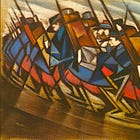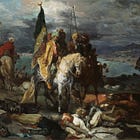How The Camel Conquered The Early Muslim World From India To Spain
Combat, logistics, survival, land navigation, and communications in one animal

For their own reasons, majorities of the fundamentalists of Islam and the sectarian critics of Islam both maintain that faith alone made the Arab conquests possible; they merely disagree whether the faith of Islam is itself good. This narrative has little material evidence to support it and is in reality a metaphysical disagreement that cannot be resolved by any scientific historical method.
As a matter of morale, which is real but psychological, and therefore difficult to evidence in the past, the Qur’an certainly provided early warriors of Islam with actual ‘marching orders’ in the form of recitations at the rate of one line per breath. Poetry was the sole art form of the Arabs before Islam, and the poetry of the prophet is very suitable for a walking pace in the desert whilst leading camels, or whilst swaying side to side with the smooth striding as one rides a camel through a desert. I believe the Qur’an was indeed the ‘Airborne Ranger’ cadence call of the armies of the early caliphate.
Ibn Khaldoun, a 14th century historian of the Arab North African maghreb, wrote his masterwork Al Muqaddama from the perspective of a successful leader of nomadic tribes in battle. Of key concern for Ibn Khaldoun is the tribal ‘asabiyya, or shared sense of unity, an Arabic-language analogue to the French term esprit de corps used in western militaries as a shorthand for unit morale and cohesion. Modern leftists have monopolized the term ‘solidarity’ for this same phenomenon.
Fired up by faith, Berber peoples would routinely overcome the mercenary forces maintained by societies that had grown fat and effete. Ibn Khaldoun’s experience in command was very like that of the prophet, as well as the Arab generals who conquered Yemen, Syria, Persia, Central Asia, Egypt, North Africa, and Spain.
However, by Ibn Khaldoun’s time, the conquered societies in question were as devoutly Muslim as the conquerors. Muslims now conquered Muslims. Religion alone cannot explain the difference in morale that he witnessed. Important, vital, and necessary as they are, moral factors are still never enough on their own to explain material success in warfare. For men cannot fight on faith alone. They must eat. They need weapons and armor and animals. Victories are purchased with gold as well as blood.
From the beginning of Muhammad’s military career, a tension existed between his need to provide his army with booty, tribute, and captives to ransom, versus his desire to end the resistance of his enemies. After his death, the armies of the caliphate were more concerned with their salaries than heavenly rewards, as captured treasures were consistently melted into coins and public treasuries supported the sons of Arab conquerors in the next generation. Whenever the sons of the prophet were asked to fight on faith alone, without pay, courage could desert them. Sinecures were necessary to secure the future of their faith.
In The Great Arab Conquests: How the Spread of Islam Changed the World We Live In, historian Hugh Kennedy writes that tribal loyalties were both sincere and fungible, a matter of literal life and death in nomadic desert existence that could be ignored or discarded whenever such loyalties became inconvenient or disadvantageous.
“When it came to the struggle for resources,” in fact, “tribal rivalries acquired a fierce and brutal intensity which they seldom had in the more open and scattered society of the desert.”1 Despite efforts to replace tribal loyalty with the umma, “tribal solidarities were in some ways reinforced by the conquest,” not the other way around. “In contrast to many narratives of the early conquests, enthusiasm for Islam and the rewards of the afterlife never figure. The values extolled are those of bravery in battle, of loyalty to kin and companions, of endurance and of cunning.”
We cannot ascribe the success of the caliphal armies to mere ‘asabiyya or their strength of faith. It puts the proverbial cart before the camel. Indeed, the Arab conquests were a material matter of maneuver and logistics, made possible by the conversion of the late Roman world to camel transport and commerce. The Arabs conquered where the camel already reigned supreme over the cart.
Keep reading with a 7-day free trial
Subscribe to Polemology Positions to keep reading this post and get 7 days of free access to the full post archives.





